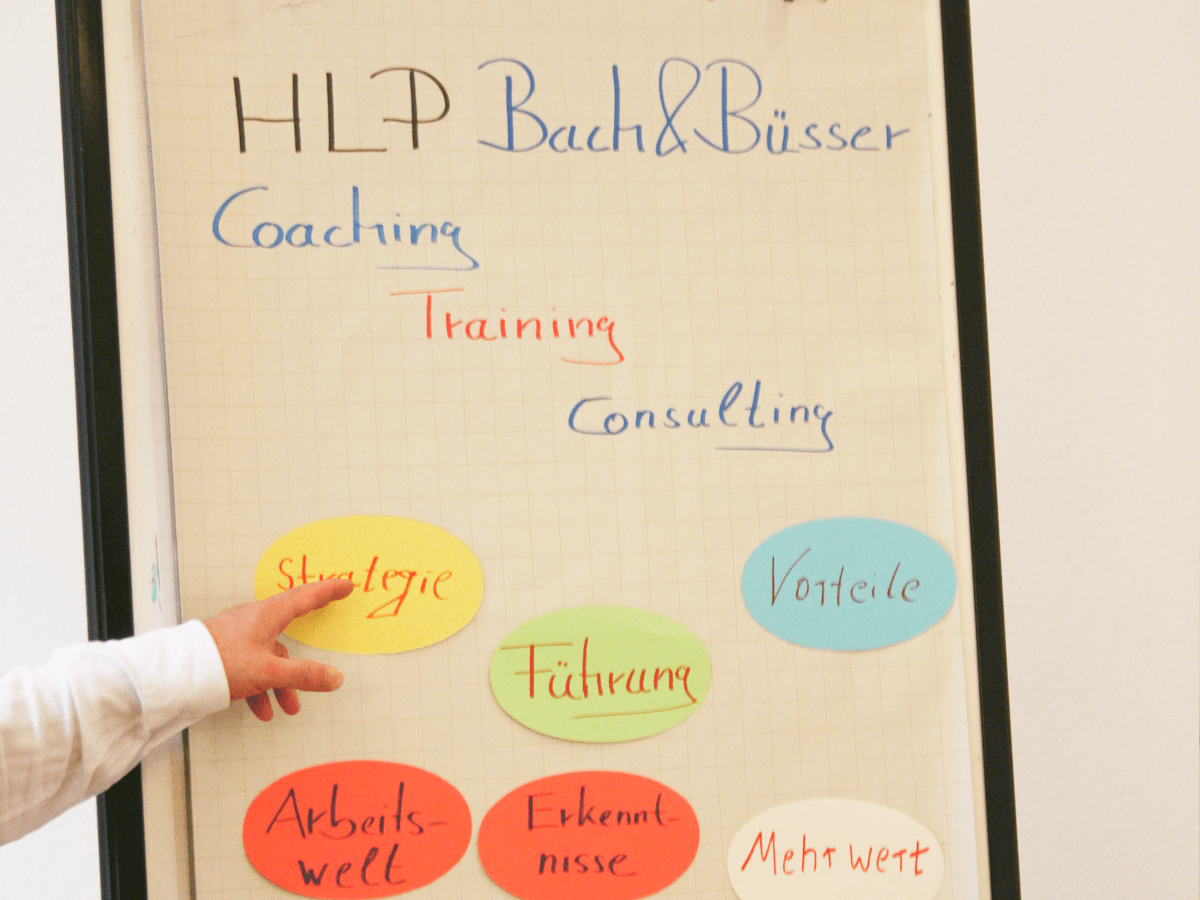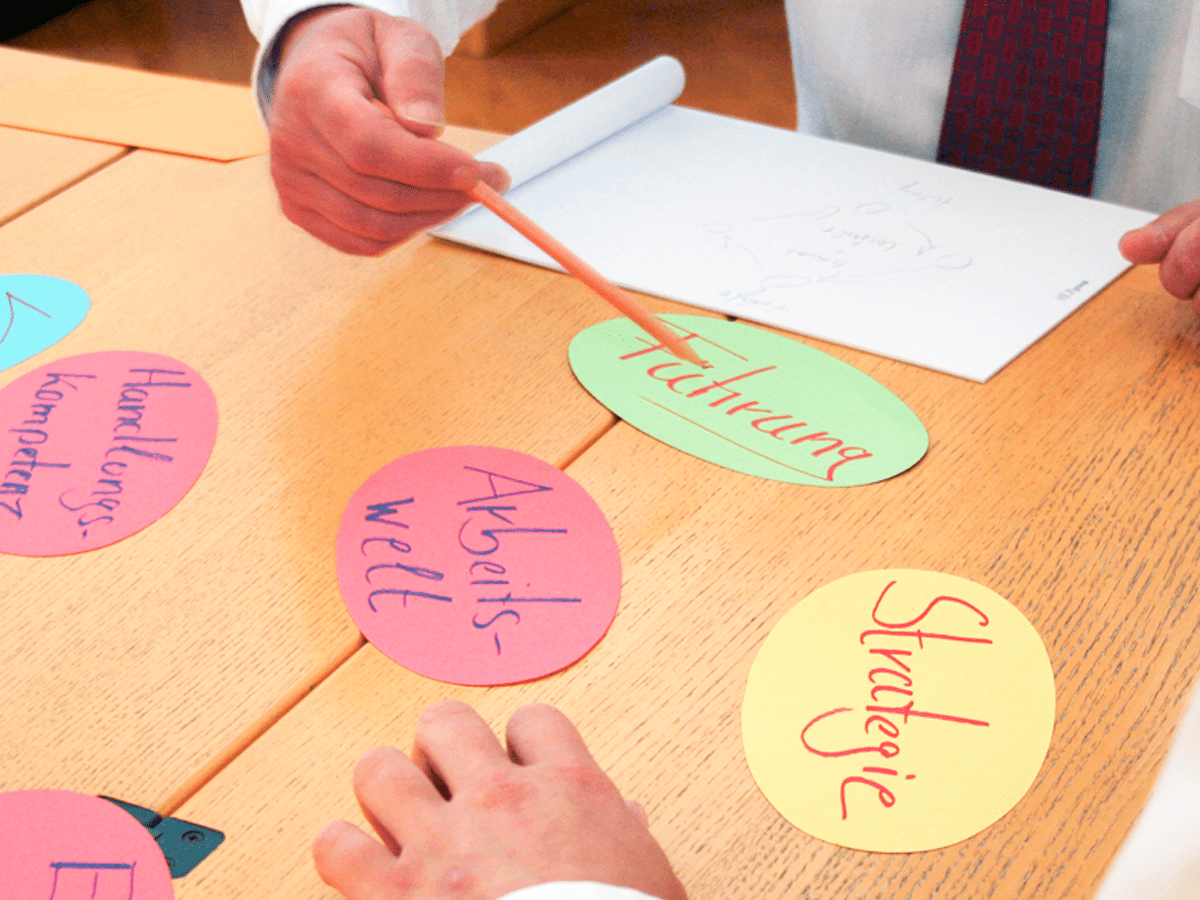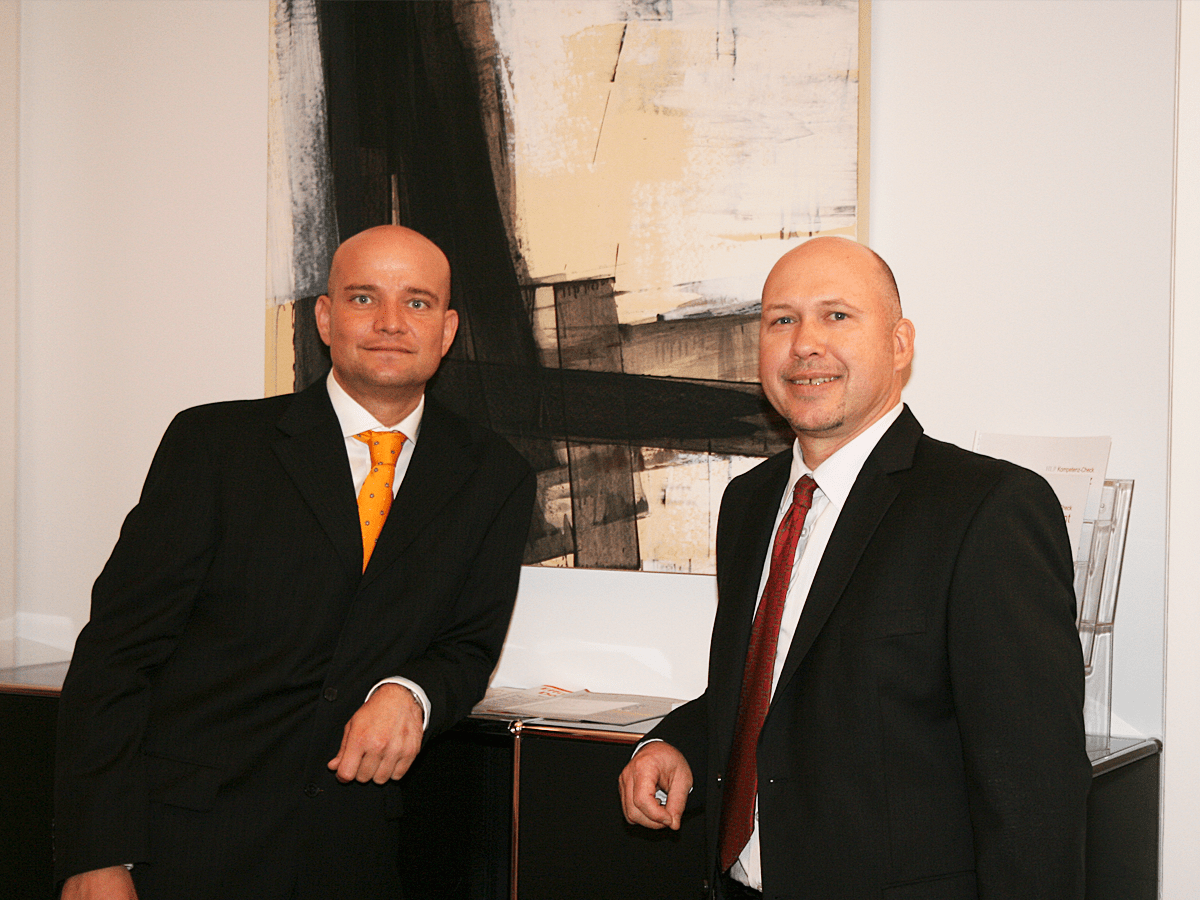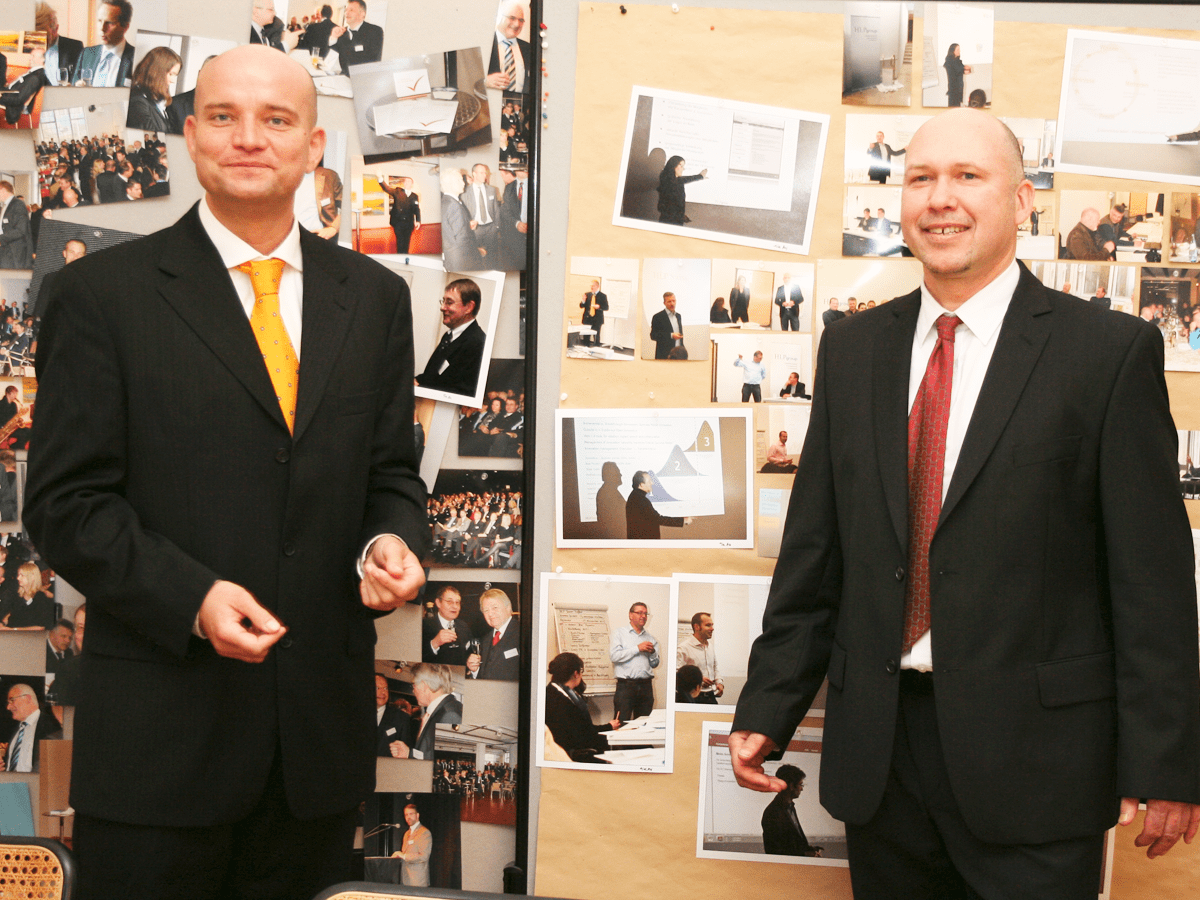Practice-oriented and targeted preparation for challenges
Coaching | Training | Consulting
Main topics from our training practice

Agile Management
You will receive a toolbox for managing innovations and projects. We give impulses, strategic approaches, practical steps, alternative concepts.

Project management
We support you in your routine work and challenges: through courses, consulting, and project coaching according to the standards of the “Gesellschaft für Projektmanagement” (GPM).

LeadershipCampus
The LeadershipCampus enables you to qualify your employees and (junior) managers and proactively bind them to your company. A modular qualification program tailored to your strategic personnel development goals. Here, you will find just a few examples of many topics.

Workshops
We gladly moderate and organize workshops for you and accompany your team as a source of inspiration with critical and constructive questions, suggestions, and our cross-sector experience.
Your benefits
- Tailor-made training
- Target group-specific and with concrete practical examples
- Practice and feedback oriented
- Coaching during training
- Application of competence checks
- In a pleasant and humorous atmosphere
You would like special training or a mix of the above-mentioned topics?
Then please contact us
We look forward to your questions and suggestions. Thanks for your interest
Training as Agile Manager
Training, structured in four modules. All modules can also be booked individually.
Fast-moving times, uncertainty, and ever-increasing complexity coupled with high customer expectations: these are some of the characteristics modern companies are confronted with and where they are required to offer new solutions.
Agile management wants to provide a suitable answer to these challenges and is already successfully applied in the areas of leadership, collaboration, innovation, work organization and project management.
But what is agile working and how do the methods differ from conventional approaches?
Your benefit: you …
- receive a proven toolbox for the successful management of innovations and projects
- receive concentrated impulses about different agile approaches, his approach, and instruments
- discuss new strategic approaches and their effectiveness for projects
- develop practical steps for their own everyday project work,
- receive an alternative way of thinking and approach to managing complexity creatively and successfully
- exchange experiences to determine their own position and the challenges of the future
Agile Manager training: Module 1: Agile concepts: Overview and Insights
Module 1 Orientation/Basic Course Agility (1 day)
- History of the origins of agile working
- Principles and mindset of agile working
- Prerequisites and framework conditions for agile working
- Advantages and limits of agile working
- Classical and agile leading
A brief overview of the concepts Kanban, Canvan, Scrum, Design Thinking
Training as an Agile Manager: Module 2: Agile project management “Scrum”
Module 2 Agile project management:
Scrum: (2 days)
- Approach and concept of the method
- definition of the cycles
- Sprint as a content push
- Daily Scrum as a common concept
- Roles, tasks, and functions of the Scrum actors
- Gate as a milestone, retrospectives as a look back and reviews as status checks
- Practical application of Scrum through ‘business game
Training as an Agile Manager: Module 3: Innovation management “Design Thinking”
Innovation Development: Design Thinking (2 days)
- Develop products and services people-centered
- The six stages of the Design Thinking Process
- From problem to the solution concept
- Discover new things through a change of perspective
- Methods and tools for systematic idea development
- Select and evaluate the ideas developed
- Testing simple prototypes with customers
- Present ideas convincingly to decision-makers
Training as an Agile Manager: Module 4: Toolbox for team development “Effectuation”
Agile Resource Focusing (Effectuation): A Toolbox for the Practice (1 day)
- What is Effectuation
- History and origin
- State of research and fields of application
- Principles of the approach
- Thinking and approach of Effectuation vs. conventional project management
- Dealing with uncertainty and insecurity — cause/effect thinking vs. systemic thinking
- Principles of Effectuation and Relevance for Innovation
- Presentation of tools for practice Identification, strengthening and further development of own resources
Project oriented work (1 day)
You are increasingly involved in projects and want an overview of project-oriented work. What is your task, role, and what can be expected of you? How can you successfully participate and how can you avoid pitfalls. You are increasingly involved in projects and want an overview of project-oriented work. What is your task, role, and what can be expected of you? How can you coöperate successfully and how can you avoid pitfalls. Project-oriented work is becoming more and more important in everyday work. This form of work is not only suitable for ‘big’ tasks but also enables you to proceed effectively with smaller change projects. Project-oriented work is often in addition to routine tasks and challenges you in your different competences to work with different people and groups on common topics.
Topics:
- Definition of project-oriented work
- Basics, advantages, and risks of project-oriented work
- Overview of different project organizations with their effects on your participation
- Goals, roles, and tasks in PA
- Activities and expectations
- Work phases in the project
- Communication in the project team
- Network and relationship management in the project environment
- Rules of the game for a successful team
Project Management Compact: For small and large projects (2 +2 days)
Module 1: Methods and techniques (2 days)
The participants should get to know and apply the methods, techniques, and tools of PM for their routine tasks and for new challenges in their daily work. It is suitable for participants who want to implement their daily business or projects in a structured and efficient way.
Topics:
- How do I clarify a new task/order?
- Dealing with scarce resources
- How do I explore the project environment (stakeholder analysis)?
- How do I plan and structure my project or everyday task? (Project planning according to project phases)
- How can I implement tasks and projects efficiently? PM methods and techniques: work breakdown structure plan, milestone plan, activity plan, cost, and personnel planning
- How can I manage and control projects?
- How can I complete a project/task in a meaningful way? (completion and documentation of a project)
Module 2: Goal-oriented and efficient coöperation in the project team (2 days)
Many projects fail not because of the inadequate application of PM methods, but because of the inadequacy of collaboration, communication, and soft skills. In this course, exactly these critical ‘soft’ factors are the topic.
- How can I involve colleagues in a task in an appreciative manner?
- How can I create commitment and reliability in the team?
- What leadership styles are there and when should they be used?
- How do I deal with different personality types?
- How can I build up motivation and maintain it in the team?
- How do I plan and conduct a meeting/kick-off efficiently?
- How do I deal with difficult situations (e.g. task/project delays)?
Practical guide to project management
Practical Guide is a manageable short guide of projects (approx. 15 pages) supported by templates/templates that support the project management. A project management practice guide, therefore, provides project management actors (in particular the project leader, the — team and the client) with an orientation about the approach, the process flow, the different roles and tasks as well as the individual steps in the project processing. In addition to the PM training courses, a PM Practice Guide supports effective coöperation between the actors, structures the project work and thus saves costs.
The aim of the Project Management Practice Guide is to …
- introduce guidance/recommendations on project management procedures for all departments
- increase the technical and economic management of projects and thus also to minimize risks
- ensure clear and transparent communication and documentation throughout the course of the project
- make coöperation on complex projects more effective
- increase the solution competence and result orientation
- communicate individual steps of project management in a simple, clear and concise manner
- be able to use the PM templates (templates) for your own project processing
Project Management Office (PMO)
Do you want to maintain an overview of a large number of projects and manage them strategically and pro-actively? Do you want to establish a service point for your project managers and employees because you want to implement your strategic goals through project work? We can support you in these questions when setting up a PMO.
Project management workshops
In project management workshops, we offer you the opportunity to work in small groups under methodical guidance on your questions, challenges and problems in such a way that you receive suggestions, solutions or a different perspective on the solution individually tailored to your particular situation. Here topics can be worked on such as …
- How do I conduct a critical discussion with a project member?
- How do I organize a kick-off?
- How can I successfully position my project with other stakeholders?
- How can I make a project presentation interesting?
Leading employees: ‘Re-freshing’ for experienced managers
You have been entrusted with the task of managing employees for some time now. You would like to reflect on your own leadership behaviour, are open to new impulses and would like to benefit from the experiences with other managers.
Topics:
- Leadership spectrum as a navigation instrument
- Personality styles — leadership styles-own position as a manager
- Feedback culture for performance improvement
- Leading successfully with goals
- Motivate yourself and your employees
- Finding solutions through the instrument of collegial consultation
- Dealing with difficult situations
From employee to manager
Taking on management tasks confronts prospective managers with a situation that differs significantly from their previous tasks. The change of tasks is associated with a change of role, which represents a particular challenge.
- The difference. From colleague to supervisor
- The first 100 days; that’s what counts.
- What to look for; what to avoid
- Defining and implementing the role of a leader
- ‘Standing’ in the new role and position
- Asserting oneself and valuing employees
- Instruction and delegation
- Employee/conflict discussions
Agile leadership and work
In this course, we develop together structures for effective agile leadership. You will get to know important mechanisms that will enable you as an agile leader to deal more flexibly with your employees, customers, external partners, and other strategic stakeholders in the future.
Topics:
- What is agile work and why do you need it?
- Faster, more uncertain, more complex: When agility is useful.
- Principles and mindset of agile working
- How employees have been ‘led’ so far (classical leadership) versus what employees can expect in terms of leadership in the future
- Future requirements and tasks for employees
- What is expected of employees in the future
Pit stop for self-reflection
In times of high complexity, you recognize new ways for yourself and how to deal with expectations. You learn to (re)discover your own resources for yourself and use this knowledge to continue your professional path. In doing so, you will be given methods that you can use for your own path.
Topics:
- Individual position-fixing
- Individual resource strengthening
- self-reflection, self-image/image of others
- Discover sources of strength
- Individual development goals
- Resilience Enhancement
- Steps into the future
The magic of effective working techniques: Time/ and self-management
Do you sometimes simply wish you had more time and calmness to be able to do everything you set out to do? Then you should be concerned with effective time and self management. It is one of the key qualifications that can make your everyday life easier.
Topics:
- Requirements and basics for effective time management
- Time management and my personality
- Design of communication and coöperation
- The art of prioritization and delegation
- Techniques of personal self-management
- Organization of the workplace
Conflict resolution and appreciative coöperation
The participants will learn about the emergence, classification, de-escalation and resolution of conflicts. In addition, they will learn about the basic conditions of an appreciative working climate and factors for increasing motivation.
Topics:
- How do conflicts arise
- What types of conflict are there?
- How can conflicts be de-escalated?
- What significance and chance do conflicts have?
- How do I get from conflict to solution?
- How does appreciation become concrete in everyday life?
- How does an appreciative management style manifest itself?
- How can I create a constructive working atmosphere?
- How do I communicate appreciatively and constructively?
- How do I give motivating feedback?
- How do I motivate employees?
In your team, you want to …
- Drive digitization processes forward
- Optimize workflows among each other
- Improve communication and collaboration
- Develop a new strategic approach